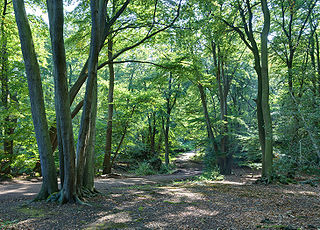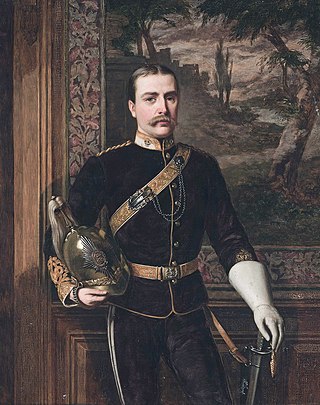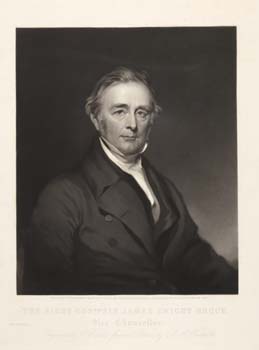
Margery Louise Allingham was an English novelist from the "Golden Age of Detective Fiction", and considered one of its four "Queens of Crime", alongside Agatha Christie, Dorothy L. Sayers and Ngaio Marsh.

Ruth Barbara Rendell, Baroness Rendell of Babergh, was an English author of thrillers and psychological murder mysteries.

Loughton is a town and civil parish in the Epping Forest District of Essex, within the metropolitan and urban area of London, England. Situated 12 miles (19 km) north-east of Charing Cross, the town borders Waltham Abbey, Theydon Bois, Chigwell, Chingford, and Buckhurst Hill.

Epping Forest is a 2,400-hectare (5,900-acre) area of ancient woodland, and other established habitats, which straddles the border between Greater London and Essex. The main body of the forest stretches from Epping in the north, to Chingford on the edge of the London built-up area. South of Chingford the forest narrows, and forms a green corridor that extends deep into East London, as far as Forest Gate; the Forest's position gives rise to its nickname, the Cockney Paradise. It is the largest forest in London.

William Wymark Jacobs was an English author of short fiction and drama. He is best known for his story "The Monkey's Paw".

Arthur George Morrison was an English writer and journalist known for realistic novels, for stories about working-class life in the East End of London, and for detective stories featuring a specific detective, Martin Hewitt. He also collected Japanese art and published several works on the subject. Much of his collection entered the British Museum, through purchase and bequest. Morrison's best known work of fiction is his novel A Child of the Jago (1896).

Poor Things: Episodes from the Early Life of Archibald McCandless M.D., Scottish Public Health Officer is a novel by Scottish writer Alasdair Gray, published in 1992. It won the Whitbread Award and the Guardian Fiction Prize the same year.

Valentines Park is a 52-hectare (130-acre) park, south of Gants Hill, it is the largest green space in the London Borough of Redbridge. The park was originally the grounds of Valentines Mansion, a residence built in 1696. Valentines Park holds a Green Flag Award and was voted one of the ten best parks in Britain in 2019.
Little Cornwall is the name given to part of Loughton, Essex, England. It is the hilly part of north-west Loughton closest to Epping Forest and characterised by steep hills, weatherboarded houses, narrow lanes and high holly hedges. There are many architecturally significant properties in this part of Loughton, including 18th-century and Arts & Crafts houses as well as Victorian homes ranging from small terraced cottages to large mansions.
Richard Marsh was the pseudonym of the English author born Richard Bernard Heldmann. A best-selling and prolific author of the late 19th century and the Edwardian period, Marsh is best known now for his supernatural thriller novel The Beetle, which was published the same year as Bram Stoker's Dracula (1897), and was initially even more popular, outselling Dracula six times over. The Beetle remained in print until 1960. Marsh produced nearly 80 volumes of fiction and numerous short stories, in genres including horror, crime, romance and humour. Many of these have been republished recently, beginning with The Beetle in 2004. Marsh's grandson Robert Aickman was a notable writer of short "strange stories".
David Adam Cairns is a British journalist, non-fiction writer and musician. He is a leading authority on the life of Berlioz.

Sir Frederic Carne Rasch, 1st Baronet was a British Conservative politician.
Loughton is a town in the county of Essex in England. The first settlement can be traced back to 2,500 years ago, but the earliest records of the modern-day site of Loughton are from the Anglo-Saxon era of English history, when it was known as Lukintone. After the Norman conquest it became part of the estate of Waltham Abbey and is mentioned in the Domesday Book as Lochintuna. It was during the 17th century, however, when Loughton began to grow significantly as a coaching stop on the newly created main route to Cambridge and East Anglia. With good transport links and proximity to both London and also Epping Forest and the countryside, it became a popular location for aristocratic and wealthy Londoners to have a home.

James Cubitt (1836–1914) was a Victorian church architect specialising in building non-conformist chapels.

Sir William Burrell was an English antiquarian.

Admiral of the Fleet Sir John West was a Royal Navy officer. West saw action as a junior officer in the first-rate HMS Royal George, the flagship of Admiral Sir Alexander Hood in the Channel Squadron, when he took part in the Glorious First of June and then in the Battle of Groix during the French Revolutionary Wars.
John Frederick Lloyd Strevens (1902–1990) was a British artist who regularly exhibited at the Royal Academy, the Royal Society of British Artists, the Royal Society of Portrait Painters and the Paris Salon.

Sir James Lewis Knight-Bruce, was an English barrister, judge and politician.
Charles Gibbon (1843–1890) was a British novelist specialising in popular romances.
Christopher Charles "Chris" Pond is a historian, librarian, and politician, was born in 1949 in Walthamstow, Essex, and grew up in Chingford, moving to Loughton, Essex in 1981.












